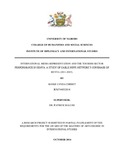| dc.description.abstract | Mass media plays a very significant role in the creation of images and beliefs among its audiences. The media and specifically international media (well-endowed with financial, infrastructural and human resources) covers events in various parts of the world. The depiction of events such as terrorism attacks, general elections and visits by prominent personalities affects the image of the host countries. This study is seeking to examine Kenya‘s international media representation, explore Kenya‘s tourism sector performance from 2011 to 2015 and determine the relationship between international representation of events in Kenya and Kenya‘s tourism sector performance. The theoretical framework used in this study is Constructivism. This theory is suitable for this study as it shows that core aspects of international relations are socially constructed and learnt. The utility of this theory is showing how ideas, views, norms and images are propagated by media to show the linkages between international media representation of events such as elections, acts of terror and visits by prominent personalities and the influence of the coverage of these events on the tourism sector performance of a country of Kenya. The study also employs descriptive research design to establish the relationship between associated with Cable News Network‘s coverage of events on Kenya‘s tourism sector performance. Data was collected from both primary and secondary sources. The findings of the study affirm that international media representation influences the image of a country, either positively or negatively. Additionally, the study found out that Kenya‘s tourism sector performance was affected by international media representation and more specifically, Cable News Network‘s coverage of major events from 2011 to 2015 affected Kenya‘s tourism sector performance. In regard to the findings, there is need to for the government through Kenya Tourism Board and Brand Kenya to have a lobbying unit as well as international media relations units to help guide Kenya‘s narrative in the international arena. This should begin with formulation of a comprehensive international media relations policy. This will address the issue of how to deal with distorted facts and have a consistent narrative. Kenya should significantly improve its security measures because it is the terrorist attacks that brought about the negative coverage by international media in the first place. Addressing the security challenge will go a long way in boosting fortunes in Kenya‘s tourism sector. Kenya should revamp its digital marketing and communication on matters tourism to counter the narratives and perceptions created by the international media. This way, foreigners interested in visiting Kenya can find positive stories about Kenya when they search through the internet. The Government should also increase advertising of the country on various international media channels to counter the negative impression created by negative events that happen in the country while also educating and informing the world audience that indeed there are great things to see in Kenya. | en_US |



